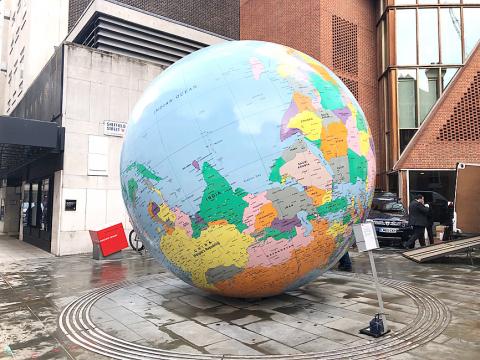The Ministry of Foreign Affairs has expressed its concern to the London School of Economics (LSE) after the school decided to change the design of a campus sculpture to depict Taiwan as part of China.
The ministry has asked its representative office in the UK to demand that the school reconsider the decision, which belittles Taiwan’s sovereign status, spokesman Andrew Lee (李憲章) said.
Lee’s comments came in response to a decision by the LSE to change the painting of a sculpture to show that Taiwan is part of the People’s Republic of China (PRC).

Photo: CNA
On Tuesday last week, the LSE unveiled the new sculpture by the Turner Prize-winning artist Mark Wallinger outside its Saw Swee Hock Student Centre.
The World Turned Upside Down is a large political globe, 4m in diameter, with nation states and borders outlined, but with “the revolutionary twist of being inverted,” according to the LSE Web site.
Most of the landmasses now lie in the “bottom” hemisphere, with nations and cities labeled for this new orientation, it says.

Photo: CNA
However, after the sculpture’s unveiling, Chinese students at LSE noticed that Taiwan was in a different color to China and they protested.
“We are deeply disappointed by this arrangement, and we firmly hold the position that Taiwan is a part of China and the PRC should be the only legal representative of China,” a statement released by Chinese LSE students said.
They called on the school to take action “to prevent any future confusion resulting from the sculpture.”
Taiwanese students at LSE issued their own statement, calling on the school to keep the original design with the Republic of China (ROC) as a separate sovereign state.
“As a sovereign state, the ROC [Taiwan] has its own democratic political institution, and respects the separation of powers and rule of law. We have our own ministries of diplomacy, national defense and interior affairs, with which PRC has no interference,” a letter from the Taiwanese students to the school said.
“Altering the content of the original sculpture not only disrespects the artist, but also denies the fact that the ROC is a sovereign state and further influences the understanding of Taiwan in the LSE community,” it added.
Following a meeting on Wednesday between Taiwanese students and their Chinese counterparts organized by the school, the LSE decided to accept the latter’s proposal to change the globe’s original design by making Taiwan the same color as the PRC.
The school pointed out that all maps released by the UN show Taiwan as a part of the PRC, making it difficult for the Taiwanese students to convince the school to keep the original design, Taiwanese LSE student Huang Li-an (黃立安) said.
The LSE put up a sign beside the sculpture saying that it understood and respected “that strong feelings exist around statehood and identity,” but called on students to engage in respectful exchanges on such issues.

The CIA has a message for Chinese government officials worried about their place in Chinese President Xi Jinping’s (習近平) government: Come work with us. The agency released two Mandarin-language videos on social media on Thursday inviting disgruntled officials to contact the CIA. The recruitment videos posted on YouTube and X racked up more than 5 million views combined in their first day. The outreach comes as CIA Director John Ratcliffe has vowed to boost the agency’s use of intelligence from human sources and its focus on China, which has recently targeted US officials with its own espionage operations. The videos are “aimed at

STEADFAST FRIEND: The bills encourage increased Taiwan-US engagement and address China’s distortion of UN Resolution 2758 to isolate Taiwan internationally The Presidential Office yesterday thanked the US House of Representatives for unanimously passing two Taiwan-related bills highlighting its solid support for Taiwan’s democracy and global participation, and for deepening bilateral relations. One of the bills, the Taiwan Assurance Implementation Act, requires the US Department of State to periodically review its guidelines for engagement with Taiwan, and report to the US Congress on the guidelines and plans to lift self-imposed limitations on US-Taiwan engagement. The other bill is the Taiwan International Solidarity Act, which clarifies that UN Resolution 2758 does not address the issue of the representation of Taiwan or its people in

US Indo-Pacific Commander Admiral Samuel Paparo on Friday expressed concern over the rate at which China is diversifying its military exercises, the Financial Times (FT) reported on Saturday. “The rates of change on the depth and breadth of their exercises is the one non-linear effect that I’ve seen in the last year that wakes me up at night or keeps me up at night,” Paparo was quoted by FT as saying while attending the annual Sedona Forum at the McCain Institute in Arizona. Paparo also expressed concern over the speed with which China was expanding its military. While the US

SHIFT: Taiwan’s better-than-expected first-quarter GDP and signs of weakness in the US have driven global capital back to emerging markets, the central bank head said The central bank yesterday blamed market speculation for the steep rise in the local currency, and urged exporters and financial institutions to stay calm and stop panic sell-offs to avoid hurting their own profitability. The nation’s top monetary policymaker said that it would step in, if necessary, to maintain order and stability in the foreign exchange market. The remarks came as the NT dollar yesterday closed up NT$0.919 to NT$30.145 against the US dollar in Taipei trading, after rising as high as NT$29.59 in intraday trading. The local currency has surged 5.85 percent against the greenback over the past two sessions, central